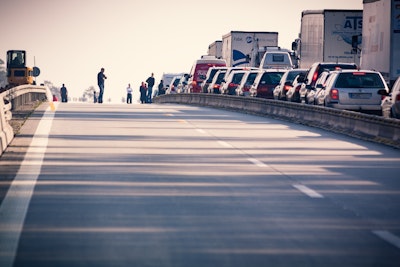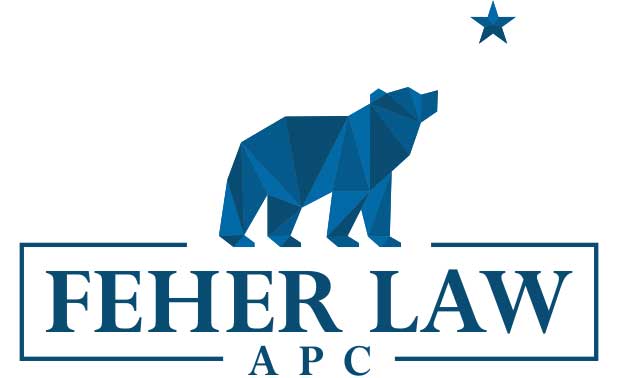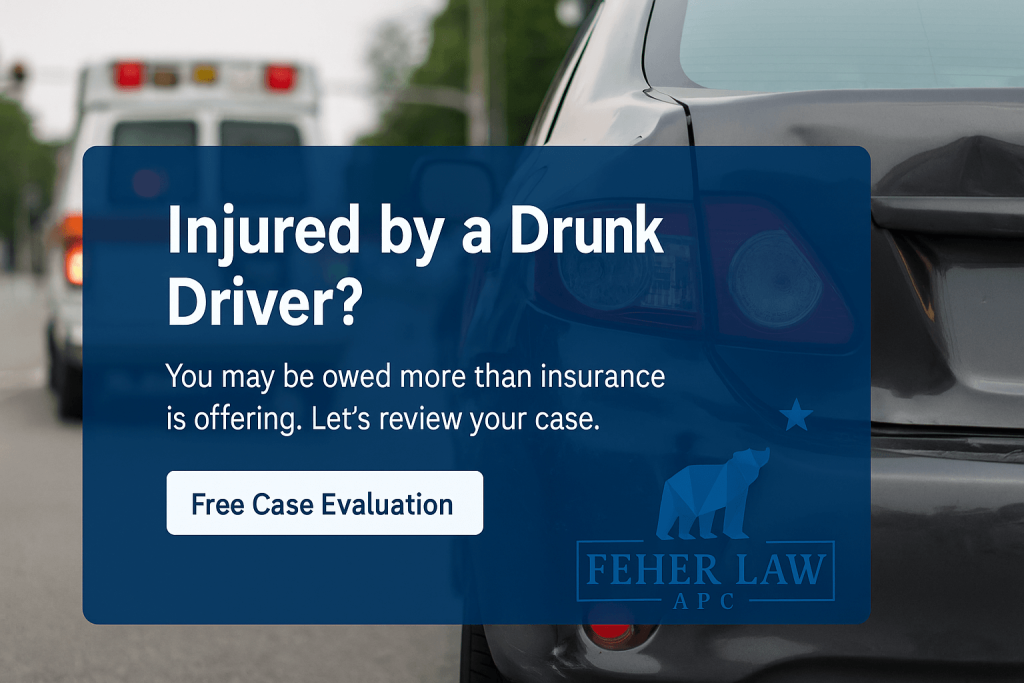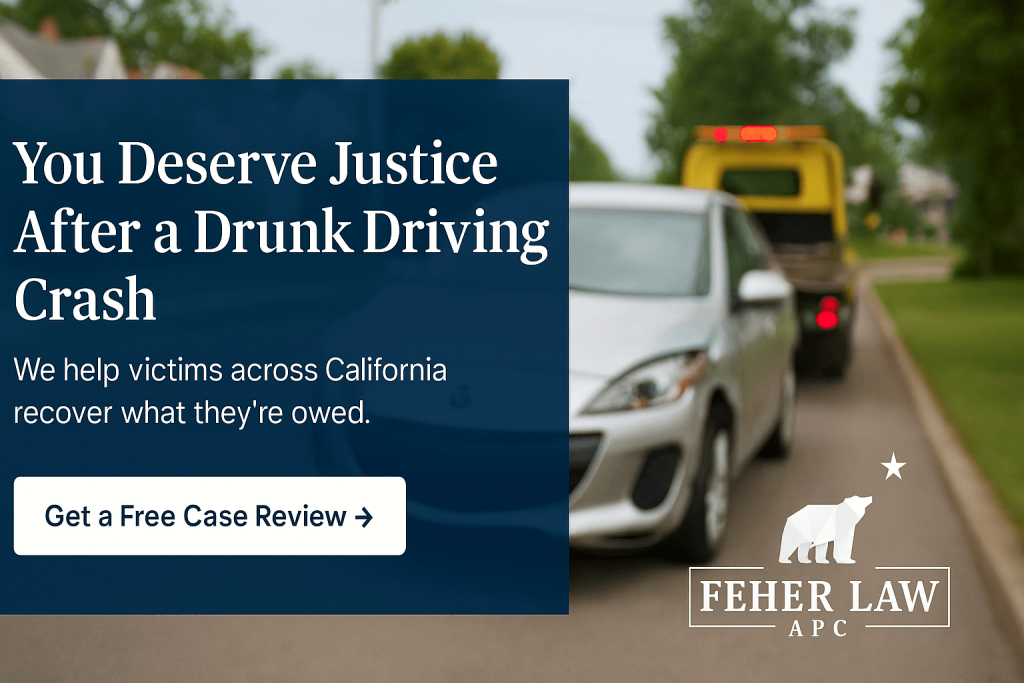Average Settlement if Hit by a Drunk Driver in California
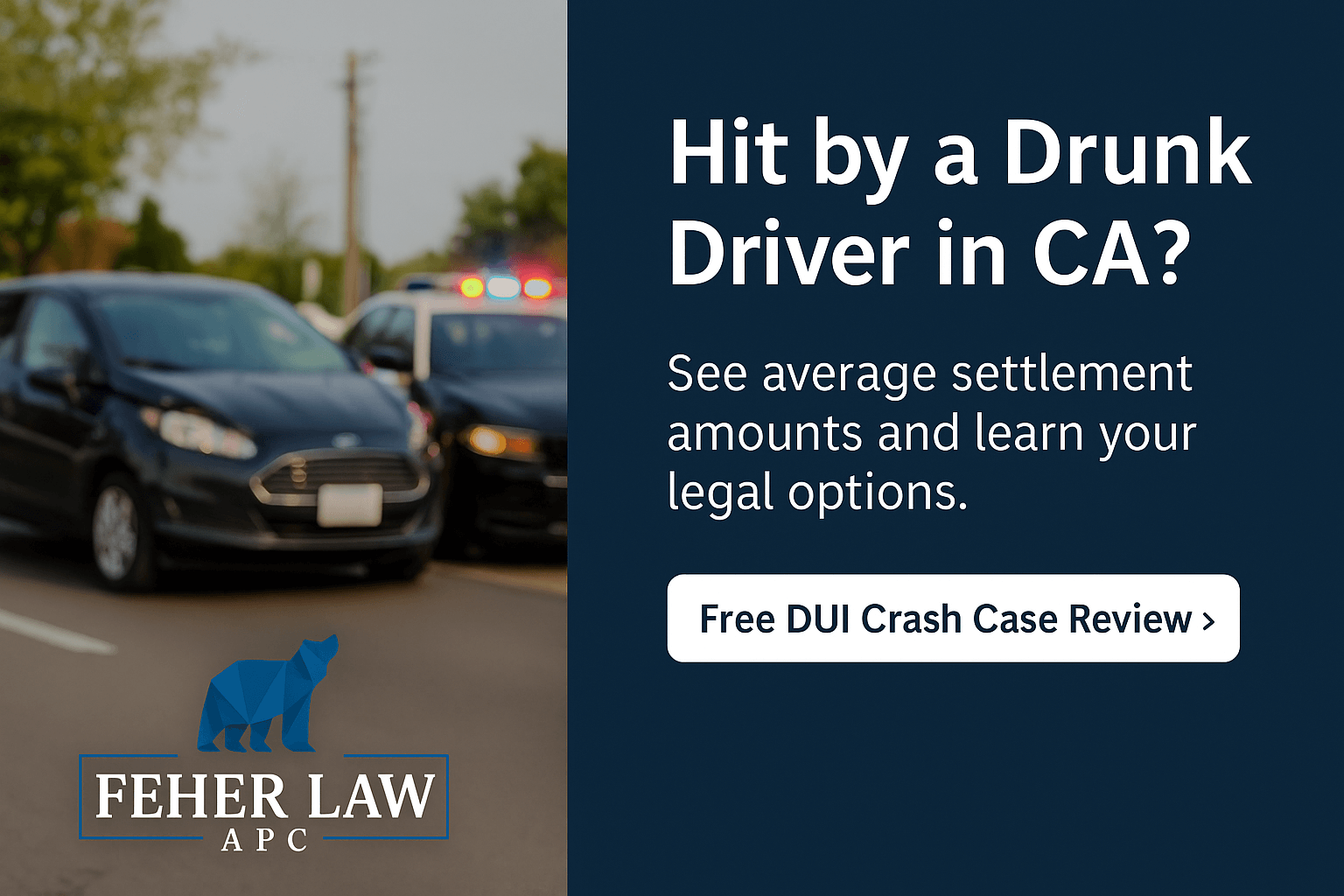
If you’re hit by a drunk driver in California, the average settlement ranges from $50,000 to $500,000. Of course, the amount could be much more than this, depending on the severity of your injuries, medical expenses, lost wages, pain and suffering, and the level of the driver’s negligence.
These elements all play a role in determining how much compensation you might receive, so let’s explore these factors in more detail.
Examples of hit by drunk driver settlements
To better understand drunk driving settlements, these examples demonstrate the variety and scope of damages that can be awarded in such cases.
- Severe Injuries Leading to High Settlement: In one case, a victim who sustained severe injuries due to a drunk driver received a settlement of $350,000. The injuries required extensive medical treatment and rehabilitation, significantly impacting the victim’s quality of life and ability to work.
- Moderate Injuries with Long-Term Effects: Another case involved a victim who suffered moderate injuries but faced long-term effects, such as chronic pain and limited mobility. This case resulted in a settlement of $150,000, covering ongoing medical costs and compensation for pain and suffering.
- Catastrophic Injuries with Permanent Disability: In a particularly tragic case, a victim was left permanently disabled after being hit by a drunk driver. This case resulted in a settlement of $500,000, reflecting the extensive medical care required, the loss of earning capacity, and the profound impact on the victim’s life.
💡 When evaluating your case, it helps to consider personal injury settlement amounts examples, which often range from lower settlements for temporary injuries to high-value claims for complex, long-term impairments.
For expert assistance in maximizing your claim, reach out to a San Bernardino car accident lawyer today!
I got hit by a drunk driver, what am I entitled to?
If you were involved in an accident involving a drunk driver in California, you are entitled to various types of damages to help cover your losses. These damages fall into two main categories: economic and non-economic.
Economic damages
Economic damages cover quantifiable financial losses, such as:
- Medical Expenses: This includes hospital bills, ongoing treatment costs, rehabilitation, and any future medical care related to the accident.
- Lost Wages: Compensation for the income you lost while recovering from your injuries, as well as any future earnings you may miss out on due to long-term or permanent disability.
- Property Damage: Costs to repair or replace your vehicle and any other property damaged in the accident.
Non-economic damages
California drunk driving accident victims can also seek non-economic damages to compensate for intangible impacts, for instance:
- Pain and Suffering: Compensation for the physical pain and emotional distress you endured because of the accident. More on this below!
- Loss of Enjoyment of Life: If your injuries prevent you from enjoying daily activities or hobbies you once loved.
- Emotional Distress: Compensation for the psychological impact of the accident, such as anxiety, depression, or post-traumatic stress disorder (PTSD).
Punitive damages for a DUI
In addition to economic and non-economic damages, victims of a DUI accident may be entitled to punitive damages. These are awarded in cases where the at-fault driver’s behavior was particularly reckless or egregious.
- Purpose: Unlike other types of damages, punitive damages are not meant to compensate the victim for specific losses. Instead, they are designed to punish the drunk driver for their reckless behavior and to deter similar conduct in the future.
- Eligibility: To be awarded punitive damages, it must be proven that the driver’s actions were not just negligent, but showed a willful disregard for the safety of others. Driving under the influence of alcohol typically meets this criterion because it is a conscious decision to engage in highly dangerous behavior.
- Amount: The amount of punitive damages can vary significantly based on the severity of the offense and the financial status of the defendant. They are often substantial enough to serve as a strong deterrent against future reckless behavior.
These damages serve as a critical tool in promoting safer driving behaviors and holding drunk drivers accountable for their dangerous actions.
If you believe your case warrants punitive damages, get in touch with an experienced attorney to discuss the specifics of your situation.
Pain and suffering when hit by a drunk driver
Pain and suffering damages in drunk driving cases often exceed those in regular car accidents due to the intentional nature of the defendant’s conduct. California courts recognize that choosing to drive while intoxicated creates enhanced emotional trauma beyond typical accidents.
How California values pain and suffering in DUI cases
DUI cases typically receive higher multipliers than standard accidents:
| Injury Severity | Standard Accident Multiplier | DUI Accident Multiplier |
|---|---|---|
| Minor (soft tissue) | 1.5-3x medical bills | 2-4x medical bills |
| Moderate (fractures) | 3-5x medical bills | 4-7x medical bills |
| Severe (permanent) | 5-8x medical bills | 7-12x medical bills |
California attorneys may also use daily rate calculations with a 25-50% DUI enhancement for the defendant’s reckless conduct.
Unique emotional trauma in DUI cases
Being hit by a drunk driver creates distinct psychological impacts:
- Betrayal of Social Trust: Victims experience deeper trauma knowing someone chose to endanger lives through intoxication.
- Heightened Driving Anxiety: Many develop anxiety about driving because the accident resulted from preventable reckless behavior rather than unavoidable circumstances.
- Moral Injury: Knowledge that injuries resulted from voluntary intoxication creates additional emotional distress beyond physical pain.
Proving enhanced pain and suffering
Essential documentation:
- Pain journals with daily descriptions and limitations
- Medical records showing pain medication and therapy needs
- Psychological treatment for accident-related trauma and PTSD
- Before/after evidence of lifestyle and activity changes
🚗 Hypothetical Scenario: A victim speeding 10 mph over the limit when hit by a drunk driver had their $200,000 pain and suffering award reduced only 10% to $180,000. The DUI factor prevented higher fault allocation to the victim.
Maximizing your recovery
Documentation strategy
- Take photos of visible injuries and their progression
- Attend all medical appointments consistently
- Report new symptoms or pain increases to doctors immediately
Trial vs. settlement
California juries typically award higher pain and suffering damages in DUI cases because jurors have strong negative feelings about drunk driving. Insurance companies often undervalue the enhanced emotional trauma, making trial potentially more favorable.
Key Strategy: Document how being victimized by someone’s conscious choice to drive drunk differs from unavoidable accident trauma. This distinction can significantly increase your pain and suffering compensation.
Drunk driver settlement amounts by type
When you’re involved in an accident with a drunk driver, the settlement you receive can vary based on the type of damage:
Rear-ended by a drunk driver settlement
The average rear-ended by a drunk driver settlement amount is $50,000 to $150,000. Rear-end collisions often result in injuries such as whiplash, back injuries, and sometimes more serious conditions.
Settlements for these accidents typically cover medical expenses, lost wages, property damage, and pain and suffering. The exact amount can vary depending on the severity of the injuries and the impact on the victim’s life.
Additional reading: average settlement for rear-end collision in California
Head-on drunk driving settlement
The average head-on collision settlement amount is $100,000 to $500,000. Head-on collisions are among the most severe types of accidents, often resulting in significant injuries or fatalities.
Settlements in these cases usually account for extensive medical treatment, long-term rehabilitation, lost wages, and profound physical and emotional hardship. The higher amounts reflect the severe impact on the victim’s physical and emotional well-being.
Additional reading: average car accident settlement in California
Wondering What Your Car Accident Case Could Be Worth?
Disclaimer: The results generated by this car accident settlement calculator are for informational purposes only. They are not legal advice or a substitute for professional evaluation. This tool offers a general estimate and does not reflect the unique details of your case, such as specific laws, liability factors, or additional specifics.
Selected Value: 0%
Factors that influence settlement amounts in California

When determining drunk driving accident settlements, several key factors come into play:
- Severity: More serious injuries often result in higher settlements due to increased medical expenses, longer recovery times, and greater impact on the victim’s life.
- Liability: Clear liability, where the drunk driver is unmistakably at fault, typically leads to higher settlements. When responsibility is easily proven, it simplifies the negotiation process.
- Comparative negligence: California follows comparative negligence laws, meaning the settlement can be adjusted based on the victim’s degree of fault. If the victim is partially responsible for the accident, their compensation may be reduced proportionately.
- Insurance coverage: The amount of insurance coverage available from both the at-fault driver and the victim can influence the potential settlement. Higher policy limits generally allow for larger settlements.
- Location: The location can also affect accident settlement amounts. Different regions may have varying costs of living and legal standards, which can impact the compensation awarded.
How victim fault affects DUI settlements in California
| Victim Fault % | Original Settlement | Reduced Settlement | Example Scenario |
|---|---|---|---|
| 0% | $500,000 | $500,000 | Rear-ended while stopped |
| 10% | $500,000 | $450,000 | Slightly speeding when hit |
| 25% | $500,000 | $375,000 | Failed to signal lane change |
| 50% | $500,000 | $250,000 | Ran stop sign, but other driver drunk |
Key Insight: Even with partial fault, California’s pure comparative negligence law allows recovery. However, DUI cases rarely assign significant fault to sober victims due to the drunk driver’s inherent negligence.
Who you can sue in DUI personal injury settlements
When you’re a victim of a CA drunk driving accident, there are several parties you can potentially sue to seek compensation for your damages. Each party may hold different levels of responsibility, and pursuing claims against them can help ensure you receive the full compensation you deserve.
The drunk driver
The most obvious party to sue is the drunk driver who caused the accident. They are directly responsible for the injuries and damages resulting from their reckless behavior. A personal injury lawsuit can be filed against the driver to cover medical expenses, lost wages, property damage, emotional distress, and other related costs.
The vehicle owner
If the drunk driver was operating a vehicle they do not own, you might be able to sue the vehicle’s owner. This can occur if the owner knowingly allows an intoxicated person to drive their car. In some cases, the vehicle owner might have insurance policies that can provide additional compensation.
Bars and restaurants
Under California’s “dram shop” laws, you can sue establishments that served alcohol to the drunk driver if it can be proven they served alcohol to an intoxicated person or a minor. These laws hold businesses accountable for contributing to drunk driving accidents by over-serving alcohol.
Employers
If the drunk driver was working at the time of the accident, their employer might also be held liable. This is particularly relevant if the employee was driving a company vehicle or was engaged in work-related activities.
Employers are responsible for their employees’ actions while they are on the job.
Government entities
In some situations, you may be able to sue a government agency if the accident was partially caused by poor road conditions, lack of proper signage, or inadequate road maintenance. Government entities must maintain safe roadways, and failure to do so can contribute to accidents.
Car manufacturers
If a defect in the vehicle contributed to the accident, you might have grounds to sue the car manufacturer. This could include issues with brakes, airbags, or other critical components that failed and led to the collision or worsened the injuries.
California’s limited dram shop liability
Unlike many states, California has restrictive dram shop laws under Civil Code Section 1714. Bars and restaurants cannot be sued for over-serving adult customers. However, liability exists for:
- Serving Minors: Establishments face liability for serving alcohol to anyone under 21
- Social Host Liability: Adults providing alcohol to minors at private parties may be liable
- Commercial Driver Exception: Special rules apply for commercial drivers with CDLs
Strategic Legal Tip: When dram shop liability doesn’t apply, focus settlement negotiations on the drunk driver’s auto insurance and any umbrella policies.
For expert guidance for your particular case, get in touch with a Torrance car accident lawyer at Feher Law today for a free consultation!
Minimum CA insurance coverage
In California, all drivers are required by law to carry a minimum amount of auto insurance to ensure that they can cover damages or injuries resulting from an accident. The state mandates specific coverage levels that every vehicle owner must maintain to legally operate their vehicle on public roads.
Liability insurance requirements
California law mandates the following minimum liability coverage limits:
- Bodily Injury Liability: $15,000 per person and $30,000 per accident.
- Property Damage Liability: $5,000 per accident.
These minimum coverage amounts are often referred to as 15/30/5 coverage. While these limits fulfill legal requirements, they might not fully cover all expenses in severe accidents, potentially leaving you financially liable for additional costs.
Uninsured/Underinsured Motorist Coverage
In California, insurance companies are required to offer Uninsured Motorist (UM) and Underinsured Motorist (UIM) coverage. Although purchasing this coverage is not mandatory, it provides important protection if you’re involved in an accident with a driver who either has no insurance or insufficient coverage.
- Uninsured Motorist Bodily Injury (UMBI): Covers medical expenses, lost wages, and other injury-related costs if you’re hit by an uninsured driver.
- Underinsured Motorist Bodily Injury (UIMBI): Kicks in when the at-fault driver’s insurance limits are too low to cover your expenses.
Should you accept the settlement offer?
Deciding whether to accept a settlement after an accident, especially one involving a drunk driver, is a critical decision. Here’s how to evaluate if the offer is fair and meets your needs:
- Evaluate the Offer: Assess if the settlement covers not only your current medical bills but also any future medical treatments or therapies you might need. Consult with healthcare providers to get an estimate of the long-term medical costs associated with your injuries.
- Ongoing Care Costs: If your injuries require ongoing care, such as physical therapy or home health aides, make sure these costs are included in the settlement. Factor in the possibility of needing assistive devices or modifications to your home or vehicle.
- Impact on Quality of Life: Reflect on how the injuries have affected your daily life, including your ability to work, enjoy hobbies, and maintain relationships. Consider compensation for pain and suffering, emotional distress, and loss of enjoyment of life.
Consulting with an experienced personal injury lawyer can provide valuable insights into whether the settlement is fair based on the specifics of your case and comparable cases.
They can help you understand the full scope of your damages and what you are entitled to under the law, and negotiate on your behalf to ensure you receive a settlement that adequately compensates you for all your losses.
They will also advise you on the likelihood of achieving a better outcome through a trial if the settlement offer is insufficient.
Remember, once you accept a settlement, you typically waive your right to pursue any further compensation related to the accident. Therefore, be confident that the offer fully addresses your needs before agreeing to it.
Steps to take after being hit by a drunk driver
Protect your health, legal rights, and potential compensation claims by following these steps:
- Ensure Safety and Seek Medical Attention: Move to a safe location if possible and check for injuries. Call 911 to report the accident and get medical help.
- Call the Police: Always report the accident to the police if they didn’t attend the scene. A police report is essential for legal and insurance purposes.
- Document the Scene: Take photos and videos of the accident scene, including vehicle damage, road conditions, and any visible injuries. Collect contact information from witnesses.
- Exchange Information: Exchange contact and insurance information with the other driver. However, avoid discussing the details of the accident or admitting fault.
- Seek Medical Attention Again: Even if you don’t feel seriously injured, see a doctor as some injuries may not be immediately apparent. Medical records are vital for your claim.
- Notify Your Insurance Company: Report the accident to your insurance provider as soon as possible. Provide them with all the necessary details and documentation.
- Keep Detailed Records: Maintain a file with all documents related to the accident, including medical bills, repair estimates, and correspondence with insurers.
- Consult with a Lawyer: Contact an experienced personal injury lawyer to discuss your case. They can help you understand your rights and the best way to proceed.
- Avoid Quick Settlements: Do not accept the first settlement offer from the insurance company. Instead, your attorney will handle the negotiation with the insurance company to get what you deserve.
- Follow Medical Advice: Adhere to all medical treatments and recommendations. This demonstrates the seriousness of your injuries and supports your claim.
How to maximize drunk driver accident settlements
1. Document Enhanced Negligence:
- Request BAC test results from police reports
- Obtain surveillance footage from nearby businesses
- Gather witness statements about erratic driving behavior
2. Leverage California’s Strict DUI Laws:
- California imposes harsh penalties on DUI offenders, including mandatory jail time for repeat offenses
- Courts view DUI as “gross negligence,” supporting higher damage awards
- Enhanced BAC levels (0.15%+) strengthen punitive damage claims
3. Strategic Medical Documentation:
- Seek immediate medical attention even for “minor” symptoms
- Follow all prescribed treatments consistently
- Document how injuries affect daily activities and work performance
Timeline for pursuing compensation for being hit by a drunk driver
1. Immediate (0-30 days):
- Criminal DUI case filed separately
- Initial insurance contact and claim filing
- Medical treatment begins
2. Investigation Phase (1-6 months):
- Police reports obtained
- Medical records compiled
- BAC test results analyzed
- Witness statements gathered
3. Negotiation Phase (6-18 months):
- Demand letter sent to insurance company
- Initial settlement offers received
- Counter-negotiations conducted
- Medical treatment potentially ongoing
4. Resolution (12-24 months average):
- Final settlement reached or trial scheduled
- California’s 2-year statute of limitations approaches
- Settlement funds distributed after legal fees
California-Specific Factor: DUI criminal cases often resolve before civil settlements, providing additional leverage in negotiations once criminal guilt is established.
Need legal help to pursue a DUI settlement in California?
If you or a loved one has been hit by a drunk driver, an experienced attorney from our law firm will help ensure you receive the compensation you deserve. Don’t face this challenging time alone—professional legal support can make all the difference.
Contact us today to discuss your specific situation and explore your options. Our team is here to help you every step of the way.

FAQs
Who pays drunk driver damages?
Damages caused by a drunk driver are typically covered by their auto insurance policy. If the driver is uninsured or underinsured, victims may seek compensation from their own uninsured/underinsured motorist coverage. In cases where insurance coverage is insufficient, legal action against the driver personally may be necessary to recover damages.
How much do lawyers take from a settlement in California?
Personal injury lawyers typically work on a contingency fee basis. This means they only collect a percentage of the settlement or court award if they win the case. The standard contingency fee is around 33% to 40% of the settlement amount, although this can vary depending on the complexity of the case and whether it goes to trial.
How is pain and suffering calculated in a car accident in California?
Pain and suffering in California car accident cases are calculated based on the severity of injuries and their impact on the victim's life. Factors considered include the extent of physical pain, emotional distress, loss of enjoyment of life, and the long-term effects of the injuries.
Insurance adjusters and courts use various methods to assign a monetary value to these intangible damages, often based on medical records, expert testimony, and the specifics of the accident.
Related Posts

Pedestrian Injured in Hollywood Car Accident
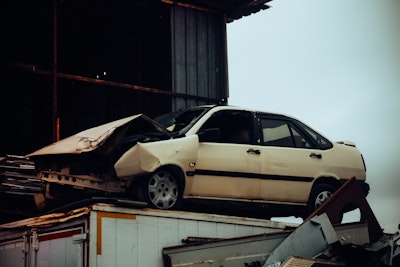
Colorado QB Dies in Single-Car Accident

Can I Sue a Drunk Driver in California?
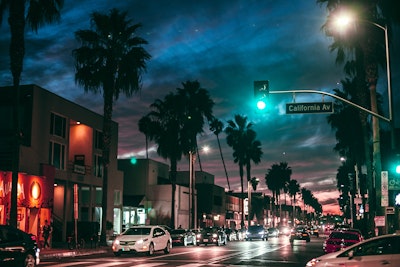
Two Killed, Three Injured in Moorpark Head-On Crash

